Hosting and SEO, your geographic location can impact ranking
The hosting provider or web host is one of the “supporting actors” that can contribute to the fortunes of a website or, on the contrary, worsen its performance: technically, it is the company that provides the technologies and services that allow a site to actually be present online on a dedicated space, using its physical servers that ensure connection to the Network. But what happens when we change hosting and, to be precise, the provider transfers its servers to another location?
The effects of a hosting location change
The topic was the focus of a recent appointment with AskGooglebot, the series on YouTube in which John Mueller answers doubts and questions (even trivial…) posed by users of the community, and in this specific case, the Search Advocate explained whether the migration of the hosting location of a website to another country could affect the SEO, what kind of practical effects could cause larger geographical displacements of servers and, above all, the two ways to target users in a specific location.
It all stems, in fact, from the request of a user, who asks Mueller: “Does the migration of the hosting location of a website affect the SEO? For example, does anything change if an Australian website (and with an Australian target audience) migrates its hosting location from Australia to the United States?“.
Google and the geographic change of the hosting
Mueller immediately clarifies that, at the initial stage of this process, “there will be some changes to the way Google treats a site” after the hosting change.
The first practical effect that you might experience after changing the hosts of your website is a slowdown in scanning: it is a precise choice made by the search engine, This way you want to make sure you don’t cause problems by scanning your site too frequently.
As soon as Google understands that there are no slowdowns and problems, the scan will resume the usual pace, reassures John Mueller.
This side effect occurs in all hosting migrations and changes that affect this aspect, so both in transfers from one provider to another and in geographical location changes performed by the company: As a first reaction, Google will always try to be cautious with initial scan requests, as a precaution to test the new process.
The impact on loading speed for users
Another aspect not to be overlooked is the service actually offered to users, because the video invites you to consider that moving the hosting of the website to a new location can affect the loading speed of the site for its visitors.
If most users connect from a geographical area very far from the new location where the website is hosted, this could result in a significantly slower user experience than, As we know, it could affect the speed and ranking factors of the Page Experience.
To be precise, Mueller says that “because of physics and computer networks, the output can take longer to reach a distant server” and depending on the strength with which these aspects are felt it can impact both organic visibility and the SEO.
How to solve hosting issues
To solve any problems encountered after the hosting provider has switched to servers located in other countries, Mueller suggests a fairly simple option, namely to use a Content Delivery Network (CDN) to host the website in multiple locations and prevent loading time from being negatively impacted.
Many CDNs allow this option, and depending on the hosting platform you are using, your site may actually be on multiple servers.
In particular, Mueller explains that “to be as close to users as possible, some websites even use servers in many different locations: a content distribution network often does this and, if you’re using a hosting platform, they might already do this for you”, ensuring that “this configuration is good for Google“.
Hosting does not impact on the SEO and geographic targeting of the site
In an even clearer way, then, Mueller clarifies that Google does not use the location of the host of the Web site for geographic targeting, and then the results and performance in the Search in a particular geographical area will not be affected by the physical change of the hosting.
“As for the SEO – concludes the Search Advocate – the location of the server is not used for geotargeting: if you want your website to address users in a specific location, you have to use the top level domain with country code or the appropriate setting in Google Search Console”, which is activated when we set the hreflang tag.
Ultimately, therefore, a change in the geographic location of a website’s hosting may cause a temporary impact on the scan and may adversely affect its loading time (and even temporarily on the budget crawl)but it’s a type of change that does not affect SEO versus geographic targeting.


